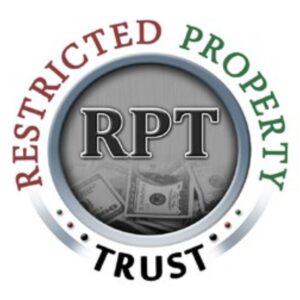Preservation and Security: The Role of Restricted Property Trusts in Modern Estate Planning
Preservation and Security: The Role of Restricted Property Trusts in Modern Estate Planning
Blog Article

In the tangled world of asset management making sure your wealth is both preserved and secured is essential. One of the most efficient tools available for achieving this goal can be the Restricted Property Trust This unique financial instrument not only offers solid protection against liabilities but also provides the foundation for efficient estate planning and wealth management.
Understanding Restricted Property Trusts
RPTs, also known as Restricted Property Trusts, are specialized institutions designed to store and manage assets while shielding them from claims by creditors and legal responsibilities. Once assets have been transferred into an RPT, they're governed by specific rules and restrictions that dictate how they can be used and distributed. This separation from the individual's personal assets creates a protective barrier, safeguarding the wealth within the trust.
Strategic Uses of Restricted Property Trusts
1. Asset Protection: One of the primary motives for using an RPT is the protection of assets from claims by creditors and legal actions. By placing assets into an RPT, the assets are shielded from possible lawsuits, divorce settlements, or any other financial risks and ensure that your assets are protected.
2. Estate Planning: RPTs are a crucial part in estate planning, providing a controlled distribution of assets. This is particularly helpful in ensuring that your estate is distributed in accordance with your wishes, while minimizing disputes between heirs, as well as cutting down on estate taxes.
3. Tax Optimization some instances, the assets in an RPT may benefit from favorable tax treatment. Depending on the structure of the trust and the country of residence, there could be tax advantages or reduction, which can help to improve the overall financial plan.
4. Preservation of Wealth: RPTs can be designed to ensure that assets are protected for future generations. By implementing specific restrictions on how the assets can use them, you will ensure that they're maintained and secured for the long-term, aligning with your goals for the future.
Benefits of Restricted Property Trusts
The benefits of strategic RPTs extend beyond mere protection. They provide a flexible approach to managing assets and estate planning, providing the possibility of personalization based on requirements and goals. The ability to set specific conditions and terms for the trust gives you a superior level of control over how assets are used and distributed.
Potential Considerations
Although RPTs provide many advantages but they also have considerations. Establishing and maintaining an RPT can be difficult and can result in more expense than other methods of asset protection. It is crucial to consult with an expert financial advisor or legal expert to ensure that the trust is established properly and is in line with your financial objectives.
Conclusion
Restricted Property Trust represent an effective tool for conserving and safeguarding your wealth. Through the use of the unique features of RPTs, you are able to safeguard your assets from potential threats, optimize tax benefits, and ensure an efficient estate plan. If you are looking to improve their wealth management strategy by exploring the advantages of Restricted Property Trusts is a proactive step towards building a long-term financial foundation and legacy preservation. Report this page